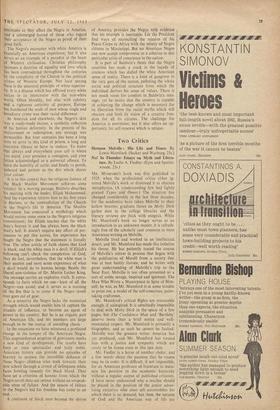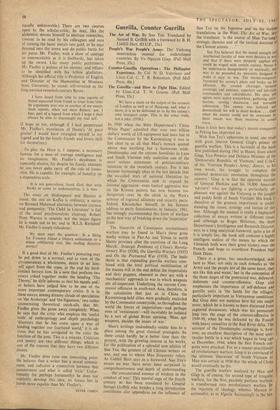Two Critics
Herman Melville : His Life and Times. By Lewis Mumford. (Seeker and Warburg, 25s.)
MR. MUMFORD'S book was first published in 1929, when the professional critics either ig- nored Melville's work or dismissed it as obscure metaphysics. (A condescending few had lightly praised Typee and Omoo.) The situation has changed considerably in the last three decades, for the academics have taken Melville to their hollow bosoms; graduate theses on Moby Dick gather dust in the college libraries and the literary reviews are thick with exegesis. While Mr. Mumford's book no longer serves as an introduction to an unknown master, it is refresh- ingly free of the scholarly cant common to most Americans writing on Melville.
Melville lived and worked in an intellectual desert, and Mr. Mumford has made this isolation his theme. He has patiently traced the course of Melville's retreat (a process that began with the publication of Mardi) from a society that was at best barely literate, and he writes with great understanding of Melville's trip to the Near East. Melville is too often presented as a sort of noble savage, inspired and ignorant, The Man Who Wrote a Masterpiece in Spite of Him- self; he was, as Mr. Mumford is at some trouble to point out, a model of the self-conscious, pains- taking craftsman.
Mr. Mumford's critical flights are reasonable enough, if uninspired. It is admittedly impossible to deal with Moby Dick in the -space of a few pages, but The Confidence Man and `Bartleby' deserve more than a brief notice and well. modulated respect. Mr. Mumford is primarily a biographer, and as such he cannot be faulted. Melville was the greatest writer America has yet produced, and Mr. Mumford has treated him with a justice and sympathy which are rarely to be found even at this late date.
Mr. Fiedler is a horse of another choler, and a few words about the pastures that he roams may be in order. It is difficult, if not impossible, for an American professor of literature to main- tain his position in the academic hierarchy without a regular output of published criticism. (I have never understood why a teacher should be placed in the position of the junior adver- tising executive who must sell automobiles for which there is no demand, but then, the natures of God and the American way of life arc equally unknowable.) There are two courses open to the scholar-critic; he may, like the alchemist, devote himself to abstruse researches, content to be read by his colleagues and sure of turning the baser metals into gold, or he may descend into the arena and do public battle for his purse. Mr. Fiedler, with a show of courage as commendable as it is foolhardy, has taken up the sword. Like many public performers, Mr. Fiedler is jealous of his identity, and refuses to be identified with his fellow gladiators. Although his official title is Professor of English and Director of the Humanities at Montana State University, he stands self-revealed as the long-awaited twentieth-century Byron :
I have heard from time to time reports of friend separated from friend or lover from lover by arguments over one or another of my essays. Such reports, when not mere flattery, are, 1 fear, part of a legend from which I hope 1 shall always be able to disentangle my real self.
(I hope so too, although if I had perpetrated Mr. Fiedler's translation of Dante's 'Al poco giorno' I would have retangled myself in my legend and let the lonely friends and lovers shift for themselves.) To play the Hero is, I suppose, a necessary fantasy for a man of average intelligence and no imagination. Mr. Fiedler's daydream is especially elusive, for despite his frantic attempts he can never quite carry off the role of icono- clast. He is capable, for example, of banality on a stupendous scale : It is not generations, thank God, that write books or come to understanding; it is men, The essay on Shakespeare and Hamlet is inane; the one on Kafka is ordinary; a notice on Bernard Malamud alternates between coyness and pomposity; 'The Child in Literature' is full • of the usual psychoanalytic claptrap; Robert Penn Warren is cetainly not the major figure he is made out to be; and in `R.L.S. Revisited' Mr. Fiedler is simply ridiculous:
We must meet the question : Is a liking for Treasure island a literary enthusiasm or a minoi subliterary vice, like reading detective stories?
If a good deal of Mr. Fiedler's posturing may be put down to a normal, and in view of the circumstances a wholesome, desire to set him- self apart from the mass, in the end his herd- instinct betrays him. In a note that prefaces two essays yoked together under the heading 'The Theory,' he slyly informs us that his equals and/ or betters have judged him to be one of the more important contemporary critics. It is in these essays, among dreamy clouds of speculation on 'the Archetype' and 'the Signature,' two rather uninteresting theoretical catch-ails, that Mr. Fiedler gives the game away completely. When he says that the critic who employs the 'useful • tools', of anthropology and depth psychology 'discovers that he has come upon a way of binding together our fractured world,' it is ob- vious that he has arrogated to the critic the function of the poet. This is a mistake. Criticism and poetry are two different things, which is one of the reasons that they have two different names.
Mr. Fiedler does raise one interesting point. He believes that a• writer has a moral commit- ment, and indicates a connection between that commitment and what is called 'style.' Unfor- tunately (or perhaps fortunately) he does not explicitly develop this idea; its future lies in hands more capable than Mr. Fiedler's.
PETER COHEN



































 Previous page
Previous page